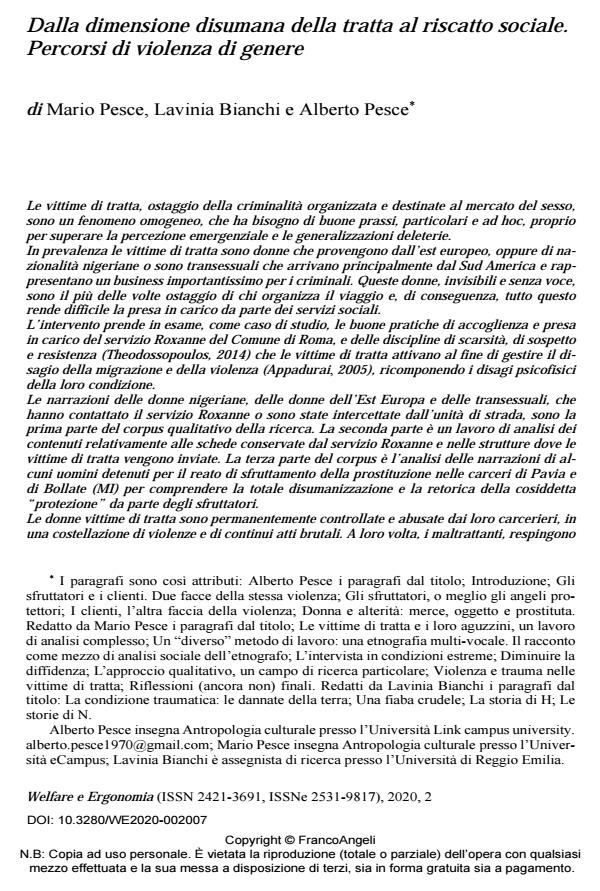From the dis-human dimension of human trafficking to social redemption. Paths of gender violence
Journal title WELFARE E ERGONOMIA
Author/s Mario Pesce, Lavinia Bianchi, Alberto Pesce
Publishing Year 2021 Issue 2020/2
Language Italian Pages 22 P. 76-97 File size 249 KB
DOI 10.3280/WE2020-002007
DOI is like a bar code for intellectual property: to have more infomation
click here
Below, you can see the article first page
If you want to buy this article in PDF format, you can do it, following the instructions to buy download credits

FrancoAngeli is member of Publishers International Linking Association, Inc (PILA), a not-for-profit association which run the CrossRef service enabling links to and from online scholarly content.
The victims of trafficking, hostage of organized crime and destined for the sex market, are a homogeneous phenomenon, which needs good, particular and ad hoc practices, just to overcome emergency perception and deleterious generalizations. Most of the victims of trafficking are women who come from Eastern Europe or of nationality Nigerians or are transsexuals who come mainly from South America and represent a very important business for criminals. These women, invisible and voiceless, are most often held hostage by those who organize the trip and, as a result, all this makes it difficult for social services to take charge. The intervention examines, as a case study, good reception practices and taking charge of the Roxanne service of the Municipality of Rome, and of the disciplines of scarcity and suspicion and resistance (Theodossopoulos, 2014) that victims of trafficking activate in order to manage the discomfort of migration and violence (Appadurai, 2005), recomposing the psychophysical discomforts of their condition. The narratives of Nigerian women, Eastern European women and transsexuals, who have contacted the Roxanne service or were intercepted by the street unit, are the first part of the qualitative corpus of research. The second part is a job of analyzing the contents on the cards stored by the Roxanne service and in the facilities where victims of trafficking are sent. The third part of the corpus is the analysis of the narratives of some men detained for the crime of exploitation of prostitution in the prisons of Pavia and Bollate (MI) to understand the total dehumanization and the rhetoric of the so-called "protection" by the exploiters. Trafficked women are permanently controlled and abused by their jailers in one constellation of violence and constant brutal acts. In turn, the abusers reject totally every responsibility projecting every guilt towards the mistreated. One of them says "they are free of do what they want, we are only here to protect them, wouldn’t you help them?". What emerges from the data analysis is a form of normalization of violence by the party of the victims of trafficking, a strong marginality (Douglas, 1993) but also a propensity to resilience.
Keywords: Gender violence; victims of human trafficking.
Mario Pesce, Lavinia Bianchi, Alberto Pesce, Dalla dimensione disumana della tratta al riscatto sociale. Percorsi di violenza di genere in "WELFARE E ERGONOMIA" 2/2020, pp 76-97, DOI: 10.3280/WE2020-002007